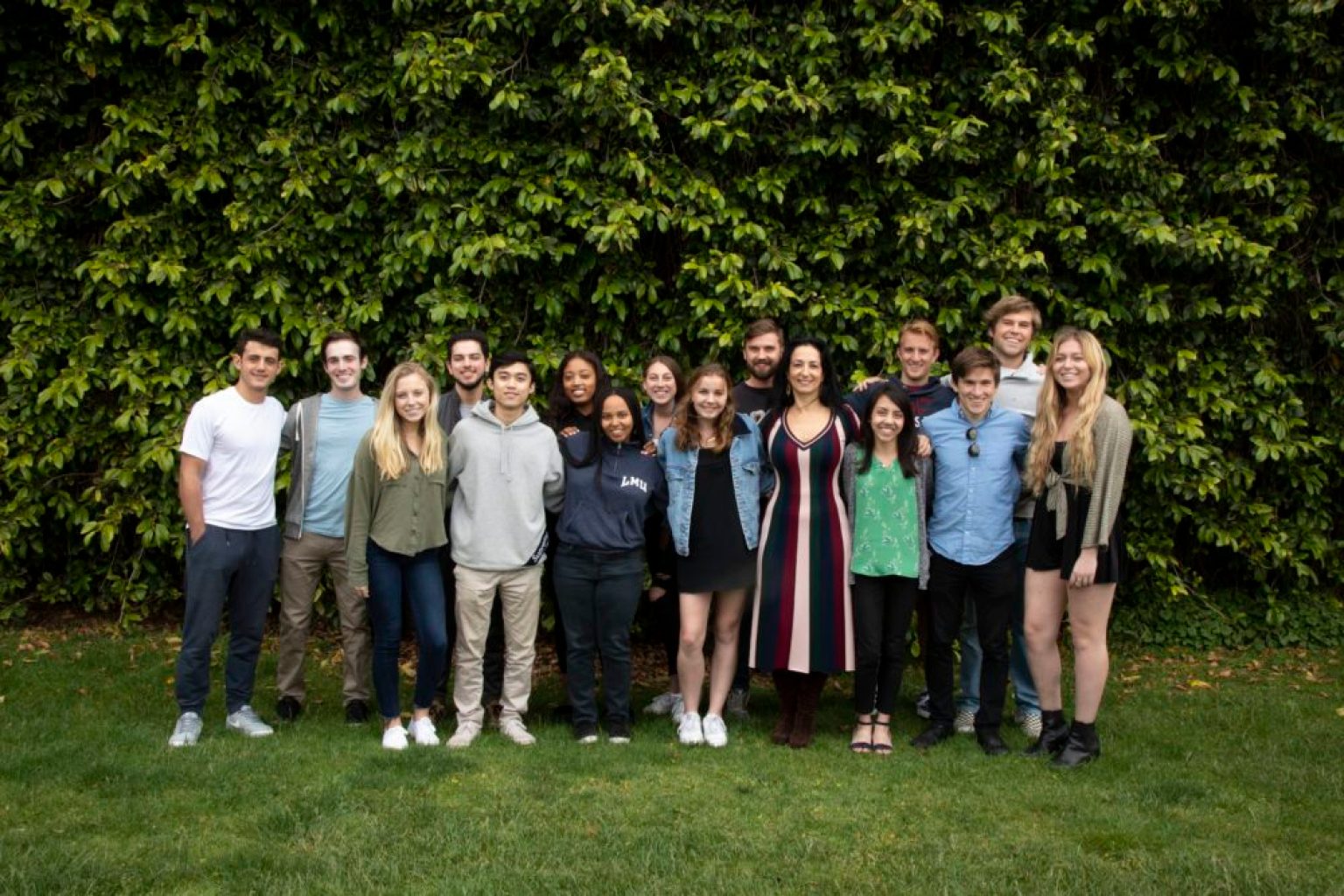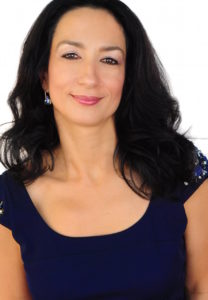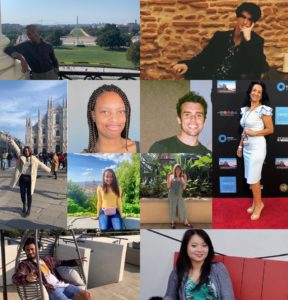
(Photo at top: Prof. Zacharia and student interns from her “Representations of Greece: Ancient and Modern” course in 2019)
For LMU Bellarmine College of Liberal Arts students who are interested in careers in the film industry, some professional opportunities can be accessed through an unexpected place: The Classics and Archaeology Department. In Professor Katerina Zacharia’s spring class, “Representations of Greece: Ancient and Modern” students study complex issues of representation through an interdisciplinary approach that highlights four areas of study: politics and economics; food and travel; theater and film; family, religion, and state. Students look at qualities attributed to ‘the other’ in the contact between cultures of asymmetrical power, explore how stereotypes are linked to contextual negotiations of identity, and consider how such identities may have originated in representations of Greece from antiquity to the modern era. In addition to their studies, BCLA students intern at the Los Angeles Greek Film Festival (LAGFF). This internship has provided many students with valuable insights into how the entertainment industry works.

As the Director of Education for LAGFF since 2015, Prof. Zacharia realized she could use her research in Greek identity formation and myths of origin narratives in visual culture to make students into better viewers and more thoughtful reviewers of Greek fiction films and documentaries: “This is an innovative course, that offers the unique opportunity for American students to engage with the Greek culture and its people through its annual film output. When we piloted the program in 2015, in the midst of the frantic weeks leading to the festival and during the five days of the festival in early June, the LAGFF staff could only make time for abbreviated training so that the students could assist with the day-to-day affairs, mostly with film promotion and hospitality support with the filmmakers and VIP guests on the festival days. Since 2016, once the students attended the new course, they acquired the requisite skills to produce critical reviews of the films screened at the festival and engage in meaningful interaction with the filmmakers.”
The results of Prof. Zacharia’s interdisciplinary approach have been impressive, to say the least. LAGFF has become a major annual foreign film event in Los Angeles that is proud of its continued partnership with LMU. Greek documentarian Vassilis Loules considers his 2016 experience of screening his documentary Kisses to the Children and visiting Prof. Zacharia’s class at LMU the highlight of a multi-year tour that included appearances at over 50 American Universities. In 2018, he organized a panel on Greek film festivals in the States, and discussed the role of Universities in the dissemination of Greek films at the Thessaloniki Film Festival. Specifically, he highlighted the LMU-LAGFF internship program; praising the quality of instruction and student work, and including his interview with Marc Hepps ’16, a major in classics and archaeology. André Enriquez ’17, an English major with a classics and archaeology minor, had his blog for the course published by the LMU English Department’s 2018 Criterion Journal of Literary Criticism. Prof. Zacharia has been regularly cross-listing her courses with the LMU School of Film and Television, and has invited numerous SFTV professors to serve as judges on the LAGFF jury, and has also created numerous internships for SFTV students. LMU students’ past contributions to the festival mean that expectations for LAGFF interns are high, and that internships are as challenging as they are interesting. Responsibilities range from reviewing scripts and projects in development to creating programs for the festival’s International Project Discovery Forum. Other students have been responsible for creating promotional content on social media, such as videos leading up to the festival and running live feeds of the event itself. In 2017, LAGFF Artistic Director, Aris Katopodis, commissioned three LMU film production rising juniors, Diego Rentsch, Oscar Martinez, and Connor Smyers, to shoot the highlights of the festival on June 7-10. These students edited and screened their highlights reel at the closing award ceremony which honored Oscar-winning Greek-American director Alexander Payne with a lifetime achievement award.
Interning for LAGFF is a great way to gain and communicate professional experience in the film industry. “As someone who has always wanted to work in film, being able to say that I helped provide coverage and select film proposals that were deserving of grants and be a part of helping run a festival and successful film lab for underrepresented filmmakers sounds impressive when I go up for interviews”, explains Saba Knife, ’20, an African American studies major. “It also has instilled a great deal of confidence in myself and my own abilities. This festival and course has been one of my favorite LMU experiences, hands down.” Gaining a familiarity with how festivals work is also one of the benefits most frequently cited. Gabriela Garza-Lainez ’17, a screenwriting major, directly credits her experience interning with LAGFF as helping her land jobs at other film festivals: “From that internship, I was able to secure a job working for the International Guadalajara Film Festival where I was in charge of interviewing the directors, actors, and producers at the festival in Spanish and English. After this opportunity, I was actually able to secure a coveted position as a programming intern for the Sundance Film Festival, where I got to help screen blind submissions and go to the festival for free. At the festival, I worked in public relations, working closely with the directors and actors of all the selected films. All this happened because of the experience I had with this course/internship and because of the connections I made during it.” Daniel de Boulay ’18, a screenwriting major, found the internship useful for similar reasons, citing his work “organizing the festival, reviewing submissions for considerations, editing materials, and providing administrative assistance” as being crucial additions to his resume, which helped him land a job at Sony Pictures after he graduated.
Such engaged learning experiences also helped students connect their interests to other potential careers. Gatsby Keyes ’18, a screenwriting major and classics and archaeology minor, was able to “gain insight into how photography exhibits and selections are made, as it showed that sometimes there are totally unrelated reasons why certain work is chosen over others e.g., run-time, ability to thematically group with other works . . . This opportunity allowed me to meet international film makers, including some I have kept in contact with, allowing me to forge connections across the world and give me new insight in how other countries approach filmmaking, music, and other creative fields.” Other students note that studying under Prof. Zacharia and interning for a foreign film festival prepared them for professions that demand cultural sensitivity. A psychology major, Maria Kondratyeva ’19, credits the course with helping her develop important soft skills in her clinical psychology training: “This course was genuinely one of the best courses offered at LMU. Professor Zacharia encouraged us to think critically about the information and images we are being presented with by the Eurocentric media, and we learned a lot about different cultures, including Greece. As a clinical psychologist in training, the knowledge I obtained from Dr. Zacharia’s class was essential, as it encouraged me to evaluate my own biases and presumptions about cultures and groups of individuals that I am not familiar with and not exposed to on a daily basis.” In particular, Kondratyeva cites the readings on Foucault as helping her evaluate ethnocentric and cultural biases within the clinical community.
Students who take the course report a long-lasting impact on their personal development. Olivia Kent ’17, screenwriting major with classics and archaeology minor, curated the blogs last year, and came back in part because of her previous experience with the program: “It definitely helped shape me as student and person. I think this class helped improve my critical writing and analysis, and it opened my eyes to the perspective of marginalized people (or “the other”) not just in Greece but universally.” Kent even wrote her own blog in 2017 when she took the course. Like the writing she curated, her own post analyzed that year’s film submissions to examine “what happens to a person’s identity and meaning when they are hit with a crisis—Greece’s Economic Crisis, in particular” and interviewed Thelyia Petraki, director of the short film Helga is in Lund (2016).
Other students frequently cite, not only the plethora of professional experience and opportunities they gained as a result of taking Professor Zacharia’s classes, but the ethical and intellectual benefits that come with a strong liberal arts education. Kitty Pham, ’20, a classics and archaeology and finance double major, as well as Professor Zacharia’s Rains Research Assistant, recollects that “this course was taught with a soul. I think that matters more for one’s intellectual experience and personal life, in addition to career preparation.” Brian Small III ’18, a film and tv production major similarly recalls how the course changed the way he saw film and the world: “This course . . . introduced me to new films, genres, and filmmakers that have been influential on my own work, and for that, I am extremely grateful. At her foundation, Dr. Zacharia is an inspiring woman. She was one of the most impactful professors I had and her leadership is palpable from day one of the class. She supported real education – meaning she did her absolute best to cater the experience to the students’ strengths while simultaneously knowing where to push for more. She’s deserving of all of her awards and then some. LMU should support her and this class because it truly is one of those one-in-a-million experiences.” Prof. Zacharia was the recipient of the 2018 LMU President’s Fritz B. Burns Distinguished Teaching Award.

Students were able to complete all of their internships for LAGFF in 2020, although the event was rescheduled from summer to fall 2020. Autumn Collins ’21, a studio arts and animation double major, worked on the LAGFF graphics; Chloë Hightower ’22, classics and archaeology and African-American studies minor, and Francesco Staluppi ’21, screenwriting major and classics and archaeology minor, worked on LAGFF’s social media outreach. Prof. Zacharia even screened her own short documentary, Blessings and Vows. The film shares the story of deep spirituality of an octogenarian villager, Mrs. Metaxia Anaplioti, who kept her vow for 40 years, lighting a candle daily at the 11th century Byzantine church of Hagioi Theodoroi in Vamvaka, Mani, in Southern Greece. The film was completed in December 2018, with grants from LMU and UCLA, and the director-producer’s personal funds. Prof. Zacharia hired Claire Andreae ’16, a film production major and LMU Scholar of the Year, as cinematographer, and during post-production engaged a talented team of LMU alumni and faculty. Blessings and Vows garnered six best short documentary awards, screened at over 20 international film festivals, and was well-received at LAGFF in 2020.
The 15th Annual LA Greek Film Festival will be held online from May 10 to May 30 of 2021. Students are encouraged to take Prof. Zacharia’s course and experience a hands-on film festival internship. Advocates of the Liberal Arts have long argued that a holistic education in the humanities and social sciences is the best preparation for intercultural and international work, as well as meaningful professions that demand heightened cultural sensitivity. “Representations of Greece: Ancient and Modern,” and its complementary internship with LAGFF, is a unique and practical example of the Liberal Arts fulfilling this promise.





